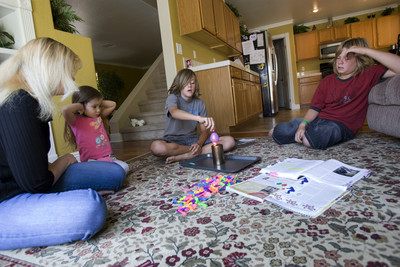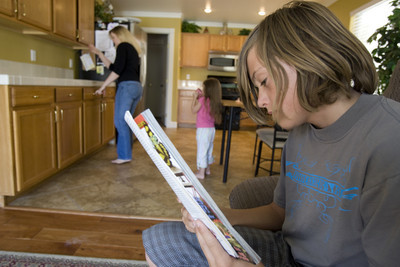More teach at home
When her 12-year-old son, Logan, was struggling to understand fractions, Chrissy Swanke ordered an unsliced pizza and demonstrated the meaning of one-eighth and one-fourth by cutting sections from the pie.
Arithmetic became the dinner-time discussion, Swanke recalled from her home.
"That's the downside of home schooling," said the Las Vegas mom. "They never get away from it."
As a single mom, Swanke is half of the usual number of parents who educate their children at home. According to the U.S. Department of Education, home-school children are 80 percent more likely than public school children to have two parents at home.
Although single parents who home-school are relatively rare, they represent a "small but noticeable trend" as home schooling becomes mainstream and options such as online classes have made the endeavor easier, said Brian Ray, president of the Home School Education Research Institute.
From 1999 to 2003, the number of single-parent households that home-school increased by 7 percent, according to the national statistics. Single-parent households represent about 18 percent of all home-school families.
Because those figures are five years old and home-school support services have grown since then, some believe the numbers are even higher today.
"Single parents are getting more and more common," said Carl Lucas, the vice chairman of the Nevada Homeschool Network. "They find ways to do it."
Lucas is a single parent himself, educating his 17-year-old son, Arie, at their home on a cattle ranch north of Reno.
Single parents show a lot of interest in home schooling, said Laura Siegel, an officer with the Nevada Homeschool Network. "It's one of the most popular questions I get."
Siegel said Las Vegas might be more conducive to single-parent home schooling than most cities because of the flexible work schedules.
"There's a lot of shift work here," she said.
Christine Plaisted said she is lucky because she works from home. A telecommuter, she writes permits for oversized-load bearing trucks. Like their mom, her 14- and 12-year-old sons are working from home, taking their classes over the Internet.
When Plaisted worked outside the home in the past, she relied on her mother and sister for help, but the advantage of home schooling is that class time need not take place between 8 a.m. and 3 p.m. on weekdays. There's always the weekend and weeknights. It's a flexibility that many people like about home schooling.
Single-parent home schooling "can be done," Plaisted said. "You just have to be creative."
Chuck Hurst, executive director of the Home School Foundation based in Virginia, acknowledged that a single-parent home school is "such a difficult road. It takes so much energy to home- school, even where there is another spouse."
It can also be lonely. Many do it "in the face of families and friends who don't share their same values," Hurst said.
Swanke said neither her son's father nor his paternal grandparents are very enthusiastic about home schooling, even though her ex was raised in a North Dakota town with fewer than 200 people and his teacher lived down the street.
"So he was, effectively, home-schooled himself," Swanke said.
Home schooling has been beneficial to their joint-custody arrangement, since Logan can visit his father in North Dakota for a month at a time without running afoul of school attendance requirements.
Because of child support, Swanke doesn't need to work outside the home but said she makes a lot of sacrifices.
"We don't go out to movies, buy a lot of new clothes or eat out," she said.
The Home School Foundation has set up scholarship programs for single parents as well as for widows and widowers. The grants, which are awarded on a need basis, are used for instruction and family emergencies. Because of the donor's request, however, the grants for single parents are limited to Christians.
Ray, the president of the Home School Education Research Institute, said scholarship programs for home-schoolers "didn't even exist 10 years ago." Home schooling is becoming more socially acceptable as "home-schoolers win spelling bees and get accepted into Harvard," he added.
There's much less stigma for parents who want to home-school.
"I would say the adult peer pressure for being different is lessening," Ray said.
He said children from single-parent home schools are performing just as well academically as their peers in two-parent households.
Frank Schnorbus, chairman of the Nevada Homeschool Network, noted that dissatisfaction with public schools has become the most common reason for home schooling, surpassing the desire to have a religious curriculum.
He said Nevada has about 4,000 home-schooled children, with 3,000 in Clark County.
Swanke became a home-school parent because she was concerned about overcrowding in the public school system. Logan was struggling with reading. Teachers were pressuring her to hold her son back a grade.
"I didn't want to stigmatize him," she said.
Since Logan left public school four years ago, he has tested at high school levels for reading and math.
"He is brilliant at math," Swanke said. "He has a very engineer-oriented but artsy mind."
Plaisted chose home schooling because she didn't want the "20 kids in a classroom" to have more influence over her kids than she did.
Plaisted, a self-described pagan who blogs about home schooling and mystic experiences on the Internet, said the stereotype that home-school parents are Christian fundamentalists is "very dated." Home schooling has "branched out far and wide," she said.
Contact reporter James Haug at jhaug @reviewjournal.com or 702-383-4686.


















